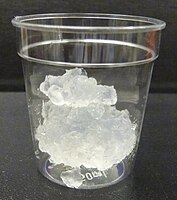
Photo from wikipedia
Abstract Switchable Pickering emulsions were prepared using polystyrene-modified magnetic nanoparticles (PS-MNPs) as stabilizers in mixtures consisted of a polar solvent, such as chloroform, and water. For this purpose, bare magnetic… Click to show full abstract
Abstract Switchable Pickering emulsions were prepared using polystyrene-modified magnetic nanoparticles (PS-MNPs) as stabilizers in mixtures consisted of a polar solvent, such as chloroform, and water. For this purpose, bare magnetic nanoparticles (bMNPs) were firstly synthesized but they were not able to stabilize emulsions prepared with chloroform. Consequently, the surface of the bMNPs was modified with polystyrene via radical polymerization to provide the nanoparticles more hydrophobic character. This resulted in stable water-in-oil (W/O) and oil-in-water (O/W) Pickering emulsions from water/chloroform mixtures. Variables affecting the coating step, including reaction time and amount of styrene in the polymerization mixture, were studied. The resulting material was characterized in terms of composition and size by infrared spectroscopy (IR-ATR), transmission microscopy (TEM) and dynamic light scattering (DLS). Next, different percentages of aqueous and oil phases were tested obtaining switchable W/O and O/W Pickering emulsions, depending on the percentages of each phase. To demonstrate what type of emulsion was formed with each percentage, the emulsions were observed under the optical microscope and both the drop and the methylene blue tests were performed. Finally, to evaluate the stability and morphology of the Pickering emulsions obtained by the PS-MNPs, the effect of the temperature, pH value and salt was also investigated in detail.
Journal Title: Colloids and Surfaces A: Physicochemical and Engineering Aspects
Year Published: 2020
Link to full text (if available)
Share on Social Media: Sign Up to like & get
recommendations!